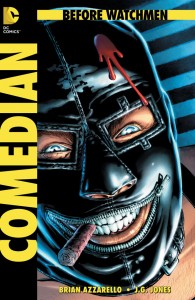 What I am about to write is not going to be objective, because The Comedian from Watchmen is just about my favorite comic character.
What I am about to write is not going to be objective, because The Comedian from Watchmen is just about my favorite comic character.
How much my favorite? Well, I not only have the movie action figure, but I also have the Comedian badge pin – you know, one of the ones that DC sold for a buck a whack in 1987 or so and which made Alan Moore lose his shit and then tell then-publisher Jeanette Kahn that he thought “DC” stood for “dook corporation.”
But that’s not all…
 …I also rock the man’s badge on the front bumper of my car. And I can already hear you: “But Rob,” you’re saying, “The bloodstain is on the wrong side!” To which I can only say: not if you see me in your rearview mirror when I’m rumbling up behind you, motherfucker.
…I also rock the man’s badge on the front bumper of my car. And I can already hear you: “But Rob,” you’re saying, “The bloodstain is on the wrong side!” To which I can only say: not if you see me in your rearview mirror when I’m rumbling up behind you, motherfucker.
My point is that The Comedian and me? We’re close. We’ve been close since I was sixteen years old. I know The Comedian, Mr. Azzarello. And this?
This is not The Comedian.
Brian Azzarello’s take on The Comedian is the first utterly wrongheaded depiction of any of the original Watchmen characters so far in Before Watchmen. It not only doesn’t jibe with the character’s portrayal in Watchmen, it doesn’t even work with The Comedian’s portrayal in Darwyn Cooke’s Minutemen, which was already coasting past Moore’s depiction of Blake’s moral ambiguity into the area of pure psychopathy. And I could handle Cooke’s nutjob in a boiler suit depiction, because it at least seemed like a logical, if previously-unseen, point on a throughline that included the attempted rape of Silk Spectre, the cold-blooded murder of a Vietnamese prostitute, and the riot gas assault of frightened protesters.
Azzarello’s take on Edward Blake doesn’t fit on that throughline. It doesn’t fit anywhere in any depiction of the character, ever.
Specifically, I no more believe that The Comedian would personally love and revere Jack and Bobby Kennedy than I believe he would drink cosmopolitans and wear Jimmy Choo pumps, or that gimp mask he’s rocking on the book’s cover, for that fucking matter.
This entire issue is devoted to demonstrating Blake’s love for the Kennedys, and the point is crudely hammered home in a discussion between Blake and Jackie Kennedy where she insists, on our behalf, that it’s love. Azzarello has The Comedian playing touch football with the Kennedys at Hyannisport, doing the Kennedys’ dirty work (and Jesus Christ, is there a famous person with a questionable cause of death who The Comedian hasn’t killed in the newly-expanded Watchmen universe?), and going almost to pieces when he learns that Kennedy was assassinated.
Now, let’s ignore the first and most obvious problem with this depiction, which is that it is strongly implied in Watchmen that The Comedian was in Dallas at the time of the assassination, bodyguarding Nixon at best and shooting from the grassy knoll at worst, and not frittering away his time chasing Moloch in Cleveland or some other non-landlocked place with a waterfront for Moloch to hole up in. Yes, let’s ignore the blowing of that characterization and story point from the arguably greatest comic story of all time out of the water and focus on what matters, which is that The Comedian from Watchmen would never feel the way he is shown by Azzarello to feel about the Kennedys, or, in fact, about any politician.
The core of The Comedian’s character was always that he saw the true nature of things, and shaped himself into a parody of them. The Comedian suffered no shine from anyone; at times his ability to see through crap made him a force of anti-entropy, as when he blew up the first meeting of The Crimebusters in Watchmen #2, and other times it made him a monster, see again the attempted rape of Silk Spectre, and his seeing through Hooded Justice’s secrets to stop Blake’s own beating in the face of that crime.
But the point is that Eddie Blake doesn’t buy your bullshit. And faced with politicians who, even as depicted in this issue, fuck around on their wives to the point only a murder can get them our of it, allow J. Edgar Hoover to grandstand the capture of a two-bit costumed villain, and cavort with gangsters, that last thing he would do would be respect them, let alone love them. Sure, he might work for them, and he might do their dirty work for them, but The Comedian would be sneering at these lightweights out of the side of his face. He’d be sneering at any politician out of the side of his face.
Further, where does this emotion for these politicians come from? We’re shown no backstory between Blake and John Kennedy beyond a throwaway, “We’ve been friends since the Pacific.” Did Kennedy save Blake’s life? Did he give him a low interest loan? Introduce him to the Bangkok hooker who knows the ping pong ball trick? Who the fuck knows? We’re meant to merely accept that the character who we’ve seen repeated act only in his own self-interest, from the murder of the Vietnamese woman carrying his child in Watchmen to the bar shakedowns of just two weeks ago; where did this sudden allegiance to Kennedy, this idealism, come from? Again: who the fuck knows?
The most affecting part of this books happens when The Comedian finds out about the Kennedy assassination, in a room with Moloch, with a yellow clock on the wall, as Blake mutters, “Got any booze in this place?” But this scene is affecting because it hearkens directly back to the scene in Watchmen #2, when Moloch recounts Blake falling apart at the scope of Veidt’s plan. It only works because it cynically calls back to a much better comic book… and is ironic, because the remainder of Comedian #1 clearly ignores the other parts of that earlier classic whenever the fuck Azzarello feels like.
On the positive side, J. G. Jones’s art here is generally a winner, as it usually is. His style here is much as always: his figures are realistic, and the man draws not only expressive faces, but damn good likenesses of real people. His strength in Mark Millar’s Wanted was that the characters looked like the actors that Millar clearly was hoping to cast in his movie adaptation, and in Comedian, the Kennedys look like the Kennedys, Cronkite on TV looks like Cronkite, and frankly, he gets a more photorealistic version of Eddie Blake, but one that is dead on for Dave Gibbons’s original. And frankly, Jones and colorist Alex Sinclair carry off the best bit of character business to be found in this book: when Blake puts on the costume, he has clearly Grecian Formulaed the grey out of his hair. It’s subtle, but it speaks more toward Blake’s innate self-absorption than any of Azzarello’s writing of the character did.
I long swore that if I didn’t like one of the Before Watchmen books, I would simply pretend that it was about whichever Charlton Comics original character upon which the Watchmen character was based. But I can’t do that here; with no backstory to clarify Eddie’s behavior in this book, I am forced to reconcile it with his characterization in Watchmen, and it imply doesn’t fit.
Combine that with the fact that Azzarello and Jones are fucking with one of my favorite characters, and you have a clear loser that I will actively recommend that you stay away from. It’s a bad adaptation, and the first so far that is a disservice to the original work. I’d sneer at it, but it’s just not funny.
 Podcast RSS Feed
Podcast RSS Feed iTunes
iTunes Google Play
Google Play Stitcher
Stitcher TuneIn Radio
TuneIn Radio Android
Android Miro Media Player
Miro Media Player Comics Podcast Network
Comics Podcast Network